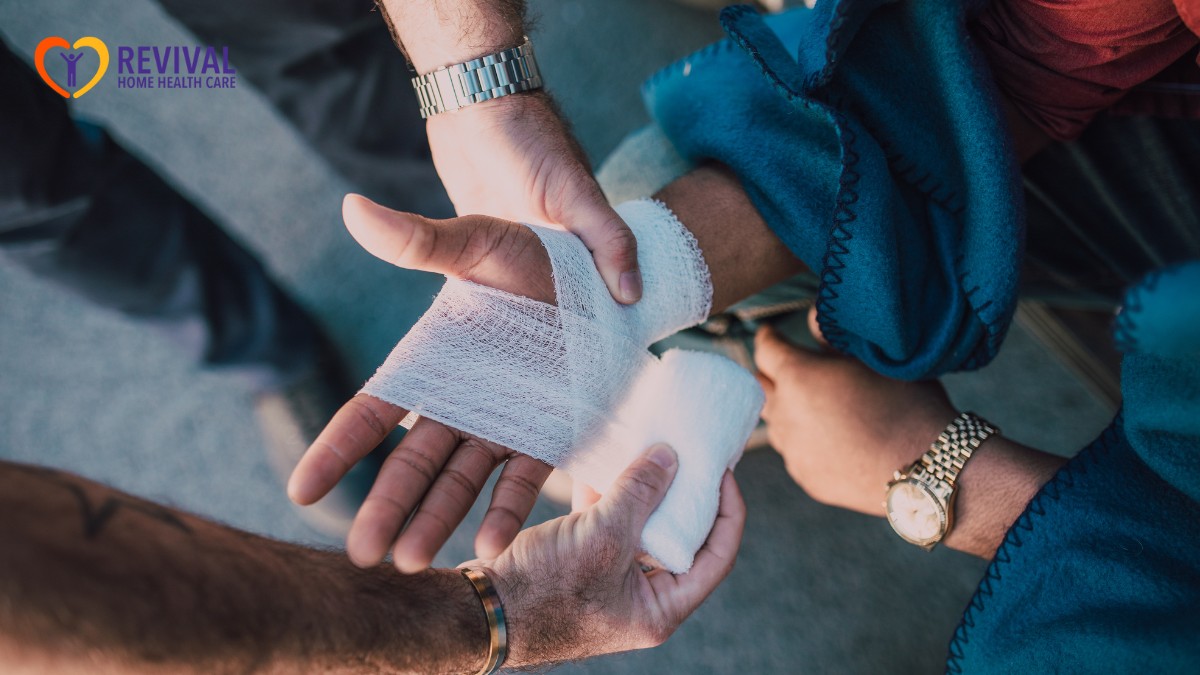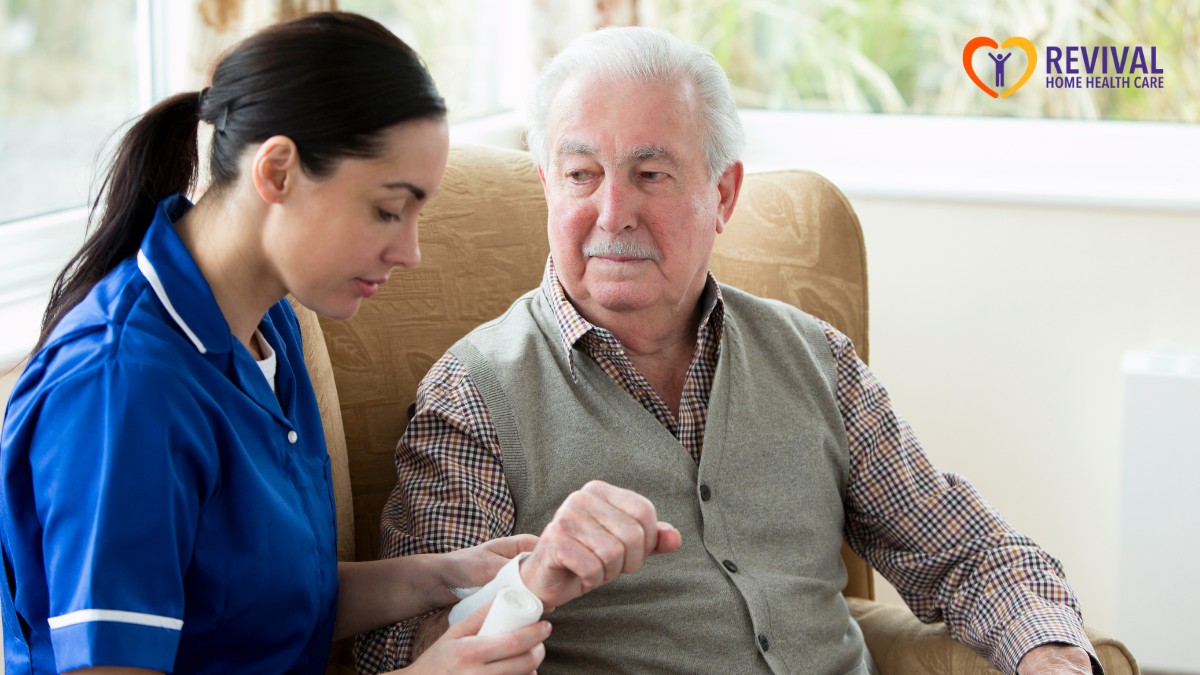Key Points:
- Seniors are more vulnerable to wounds that can lead to serious complications if not treated promptly.
- Timely wound care helps prevent infection, supports faster healing, and reduces hospital visits.
- Families and caregivers play a key role in recognizing early signs and seeking professional in-home wound care.
A simple wound may seem like a small issue, but for seniors, it can quickly escalate into something far more serious. With age, the body’s ability to heal slows down, and untreated or improperly managed wounds can lead to infections, hospitalizations, and even long-term disability. In this guide, we’ll explore why timely wound care for seniors is so important, what warning signs to look for, and how families can take practical steps to support healing at home.
Why Seniors Are More Vulnerable to Wounds
Understanding why older adults are more susceptible to wounds—and why these wounds can become more dangerous—is the first step toward better care.
The Effects of Aging on Skin and Healing
As we age, the skin becomes thinner, drier, and more fragile. Collagen production slows down, making the skin less elastic and more prone to tearing. Blood circulation also tends to decline, which limits the body’s ability to deliver oxygen and nutrients to damaged tissue.
These changes make seniors more likely to experience:
- Skin tears from minor bumps
- Pressure ulcers from sitting or lying too long
- Slow-healing surgical wounds or diabetic ulcers
- Infection from small scrapes or blisters
Chronic Conditions That Impact Healing
Many seniors live with chronic conditions like diabetes, vascular disease, or mobility issues. These conditions can complicate wound healing by:
- Reducing blood flow
- Impairing immune function
- Causing nerve damage (which may reduce pain awareness)
That’s why even a small wound shouldn’t be ignored in older adults—it needs proper assessment and care from the start.

The Risks of Delayed Wound Treatment
Wounds that aren’t treated quickly can escalate into more severe health problems. Here’s why prompt care is critical.
Increased Risk of Infection
Bacteria can enter through even the smallest break in the skin. In seniors, infections tend to spread more rapidly due to a weakened immune system. Left untreated, an infection can lead to cellulitis, sepsis, or even amputation in severe cases.
Compromised Mobility and Independence
When wounds become painful or infected, it often leads to limited movement. Seniors may avoid walking or using the affected area, which can cause muscle loss, increased fall risk, and greater dependence on caregivers.
Longer Recovery Times
Delayed care often means a longer path to healing. Chronic wounds may require weeks or months to resolve, leading to prolonged discomfort, ongoing care costs, and emotional strain on both the patient and family.
Recognizing Early Warning Signs of Wound Complications
Quick action starts with knowing what to look for. These signs often indicate that a wound needs professional attention.
- Redness or swelling that gets worse over time
- Warmth around the wound site
- Drainage or pus
- Increasing pain
- A foul odor
- Fever or chills (possible signs of infection)
Family members and in-home caregivers are often the first to notice changes. Regular skin checks, especially for those who are immobile or diabetic, can make a big difference. Look at heels, elbows, the lower back, and any area where skin rubs or rests on surfaces for extended periods.
The Benefits of Timely Wound Care for Seniors
Catching and treating wounds early doesn’t just avoid problems—it actively supports health and independence.
Faster Healing
Timely intervention with the right cleaning, dressing, and care plan can speed up recovery. Seniors are less likely to develop chronic wounds that require ongoing treatment when care begins early.
Reduced Hospital Visits
Preventing complications like infections or deep tissue damage can help seniors stay out of the hospital. Home wound care services reduce the need for travel and help avoid emergency care.
Improved Quality of Life
Pain, limited mobility, and constant medical attention can impact a senior’s emotional and physical well-being. Effective wound care restores comfort and supports daily functioning, helping seniors maintain their independence for as long as possible.

Best Practices for Managing Wound Care at Home
When wounds are treated at home, it’s essential to follow structured, medically guided routines. Here’s how to support healing in a home environment.
1. Keep the Wound Clean and Protected
Use sterile supplies and wash your hands before touching the wound. Follow professional guidance on how often to change dressings, and avoid using over-the-counter ointments unless advised by a nurse or doctor.
2. Monitor Progress Daily
Document the wound’s size, color, and any changes in drainage or sensation. Use a wound care chart or take photos (if appropriate) to share with your healthcare provider during follow-up visits.
3. Encourage Good Nutrition and Hydration
The body needs nutrients to repair tissue. Seniors should eat balanced meals rich in protein, vitamin C, and zinc. Adequate hydration supports circulation and immune response.
4. Avoid Pressure and Friction
Use cushions, soft bedding, or positioning aids to relieve pressure on vulnerable skin areas. Encourage movement as tolerated to improve circulation and prevent new wounds.
When to Call in Professional Help
Even the most attentive caregivers can’t do it all alone. Here’s when to bring in a trained wound care specialist:
- The wound is large, deep, or not healing after a week
- There’s a noticeable infection or worsening symptoms
- The senior has diabetes or circulatory problems
- There’s pain despite treatment
- You’re unsure about dressing types or care routines
Professional in-home wound care providers offer skilled nursing, advanced dressings, and tailored care plans. Their involvement can prevent complications and support long-term healing.

Emotional Support and Patience Go a Long Way
Healing takes time, and it’s not always a smooth process. Seniors may feel frustrated, embarrassed, or even depressed by their condition. Offering emotional support is just as important as physical care.
Be Encouraging and Compassionate
A kind tone, gentle approach, and reassurance can ease anxiety. Include the senior in discussions about their care and listen to their concerns.
Celebrate Small Wins
Even minor improvements—less pain, smaller wound size, or better sleep—are worth acknowledging. Positive reinforcement helps maintain morale through the recovery process.
Support Healing at Home with Revival’s In-Home Wound Care Services
Take the first step toward better healing—right at home.
If you’re caring for a loved one who needs attentive wound management, Revival offers compassionate, skilled home health services in New York. Our trained professionals work closely with families to deliver personalized care, right where your loved one is most comfortable.
From wound cleaning to monitoring and dressing changes, Revival helps ensure every step of the healing process is supported with care and expertise. Get in touch with us today to learn how our team can help bring safer, timely care home.


 75 Vanderbilt Ave Staten Island, NY 10304
75 Vanderbilt Ave Staten Island, NY 10304 info@revivalhhc.org
info@revivalhhc.org 718.629.1000
718.629.1000